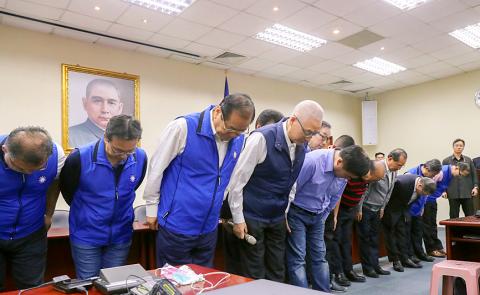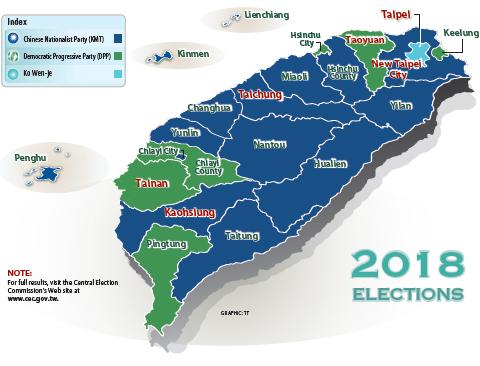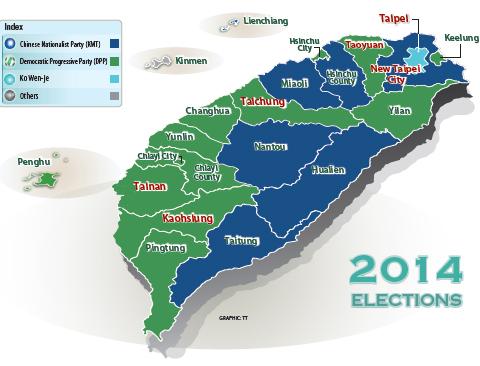The Chinese Nationalist Party’s (KMT) landslide victory in Saturday’s nine-in-one elections appears to owe much to Kaohsiung mayor-elect Han Kuo-yu (韓國瑜), whose meteoric rise gave the party momentum and connected frustrated voters eager to punish the administration of President Tsai Ing-wen (蔡英文).
Prior to the elections, the KMT said that winning 1.5 times the number of cities and counties the party had — six — and flipping Taichung would constitute victory, KMT Culture and Communications Committee deputy director-general Hung Meng-kai (洪孟楷) said.
“The results are definitely beyond our expectations. Not only did we grab Taichung, we also took Kaohsiung, constituting a historic victory,” Hung said, referring to success in mayoral and commissioner elections in 15 out of 22 cities and counties, including three of the six special municipalities.

Photo: CNA
Hung said the effect of the so-called “Han tide” spread to other cities and counties, allowing the party’s candidates to secure victory in elections initially expected to be tight, such as Yunlin County and Taichung.
It also helped narrow the gap between the KMT and the Democratic Progressive Party (DPP) in traditionally pan-green constituencies like Tainan and Pingtung County, he said.
In the 2014, then-Tainan mayor William Lai (賴清德) crushed his KMT rival, then-National University of Tainan president Huang Hsiu-shuang (黃秀霜), by a margin of 447,021 votes. That gap shrank to just 54,644 on Saturday.

Eric Yu (俞振華), an associate research fellow at National Chengchi University’s Election Study Center, also said that Han was a major factor in the KMT’s victory.
He was the glue for different groups of voters who were dissatisfied with the performance of Tsai’s administration, Yu said.
“Rather than thinking that Saturday’s results were because the KMT did a good job in opposition, it is more accurate to say they were due to voters’ overwhelmingly negative perception of the DPP,” Yu said.

Another key factor in the KMT’s wins was the DPP’s adoption of a “value-centered” campaign strategy, despite Tsai winning the 2016 presidential race by painting herself as a pragmatist and centrist, Yu said, citing the ruling party’s tactic of painting a vote for the KMT as a vote against democracy and reform.
The DPP administration’s effort to push for transitional justice was also a factor, as fewer than 5 percent of Taiwanese would list it as a priority in opinion polls, he said, adding that the public clearly places the economy above values.
Han’s call for love and tolerance, and his decision to act on those values by not suing talk show host Cheng Hung-yi (鄭弘儀) over allegedly false accusations against him spoke volumes, National Sun Yat-sen University professor of political science Liao Da-chi (廖達琪) said.
However, the KMT’s overwhelming victory should not be interpreted as voters being fond of the party, as it only reflected growing impatience with unsatisfactory leadership, Liao said.
While its momentum is likely to last until the 2020 presidential election, it is too early for the DPP to give up, Liao said.
“Voters want to see local elections revolve around matters of the economy, not independence or unification, while for presidential races, the focus is more on national sovereignty,” she said.
When asked about the 2020 race, Hung said that the KMT would try to produce a result like Saturday’s, but would keep a cautious attitude.
The KMT could begin its presidential nomination process next year, Hung said, adding, however, that its next goal was to win by-elections to be held within three months to fill vacancies left by five lawmakers who have resigned.

Chinese Nationalist Party (KMT) Chairman Eric Chu (朱立倫), spokeswoman Yang Chih-yu (楊智伃) and Legislator Hsieh Lung-chieh (謝龍介) would be summoned by police for questioning for leading an illegal assembly on Thursday evening last week, Minister of the Interior Liu Shyh-fang (劉世芳) said today. The three KMT officials led an assembly outside the Taipei City Prosecutors’ Office, a restricted area where public assembly is not allowed, protesting the questioning of several KMT staff and searches of KMT headquarters and offices in a recall petition forgery case. Chu, Yang and Hsieh are all suspected of contravening the Assembly and Parade Act (集會遊行法) by holding

PRAISE: Japanese visitor Takashi Kubota said the Taiwanese temple architecture images showcased in the AI Art Gallery were the most impressive displays he saw Taiwan does not have an official pavilion at the World Expo in Osaka, Japan, because of its diplomatic predicament, but the government-backed Tech World pavilion is drawing interest with its unique recreations of works by Taiwanese artists. The pavilion features an artificial intelligence (AI)-based art gallery showcasing works of famous Taiwanese artists from the Japanese colonial period using innovative technologies. Among its main simulated displays are Eastern gouache paintings by Chen Chin (陳進), Lin Yu-shan (林玉山) and Kuo Hsueh-hu (郭雪湖), who were the three young Taiwanese painters selected for the East Asian Painting exhibition in 1927. Gouache is a water-based

Taiwan would welcome the return of Honduras as a diplomatic ally if its next president decides to make such a move, Minister of Foreign Affairs Lin Chia-lung (林佳龍) said yesterday. “Of course, we would welcome Honduras if they want to restore diplomatic ties with Taiwan after their elections,” Lin said at a meeting of the legislature’s Foreign Affairs and National Defense Committee, when asked to comment on statements made by two of the three Honduran presidential candidates during the presidential campaign in the Central American country. Taiwan is paying close attention to the region as a whole in the wake of a

OFF-TARGET: More than 30,000 participants were expected to take part in the Games next month, but only 6,550 foreign and 19,400 Taiwanese athletes have registered Taipei city councilors yesterday blasted the organizers of next month’s World Masters Games over sudden timetable and venue changes, which they said have caused thousands of participants to back out of the international sporting event, among other organizational issues. They also cited visa delays and political interference by China as reasons many foreign athletes are requesting refunds for the event, to be held from May 17 to 30. Jointly organized by the Taipei and New Taipei City governments, the games have been rocked by numerous controversies since preparations began in 2020. Taipei City Councilor Lin Yen-feng (林延鳳) said yesterday that new measures by